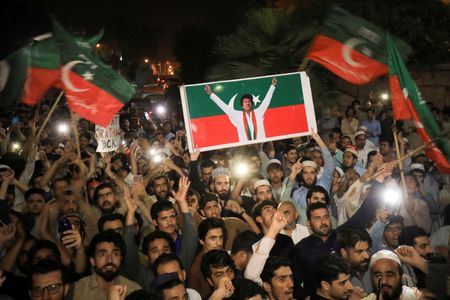
Pak Prez asks Chief Justice to form judicial commission to probe regime change conspiracy to oust Imran Khan

Islamabad, May 13 (PTI) Pakistan’s President Arif Alvi has written to Chief Justice Umar Ata Bandial, asking him to form a judicial commission to probe the alleged “regime change conspiracy” to oust former prime minister Imran Khan and to prevent a “political powder keg” from igniting in the country.
Khan, ousted through a no-trust vote on April 10, has accused the US of orchestrating the fall of his government after he decided to follow an independent foreign policy over the issue of Ukraine. The US repeatedly refuted Khan’s allegations. Khan, the 22nd prime minister of Pakistan, became the first chief executive to be removed from office after losing the majority in the National Assembly.
Khan has been pressing the government to investigate the matter through the Supreme Court and about two weeks ago also wrote a letter to Chief Justice Bandial to set up a probe commission. President Alvi in his letter to the Chief Justice on Thursday urged him to constitute a judicial commission to investigate the “regime change conspiracy”, suggesting the commission should preferably be headed by Bandial himself and must conduct open hearings to “thoroughly probe the allegations of regime change conspiracy to avert a political and economic crisis in the country”.
Emphasising the importance of the commission, the president warned that a serious political crisis was looming in Pakistan, saying major polarisation was also taking place in politics as well as among the people of Pakistan. “It is regrettable that random comments are being quoted out of context, misunderstandings are fuelling, opportunities are being lost, confusions not dying down, and with the economy also in crisis, while the situation on the ground is approaching a political powder keg that may ignite at any time,” he said in the letter.
Alvi pointed out that the Supreme Court had taken such initiatives in the past to constitute judicial commissions in matters of national security, integrity, sovereignty and public interest. “A judicial commission, headed by [former] chief justice Nasir ul Mulk and two judges of the top court, inquired into rigging allegations in 2013 elections. Similarly, judicial commissions were also formed to investigate the Memogate matter, and moreover, a judicial commission is also currently functional for missing persons, that is headed by a sitting judge”, he observed.
Alvi requested that the proposed judicial commission should conduct an in-depth and thorough investigation into the regime change conspiracy. He emphasised that it was the collective duty of all institutions to make utmost efforts to avert damaging consequences to the country and prevent further deterioration. President Alvi said that there seemed to be a political consensus in the country as, according to press reports, the prime minister had also expressed a desire for establishing a commission.
He expressed that the nation held the Supreme Court in high regard and expected it to meet its expectations, adding that the commission should investigate the matter based not on technicalities of law but in the real spirit of justice. “Undoubtedly, it would be a great service to our country, as the people of Pakistan deserved clarity on such a matter of national importance,” he said.
President Alvi went on to add that in world history, there existed myriad examples of regime change operations through conspiracies which were later confirmed by the declassification of top-secret documents. He lamented that it happened much later after the destinies of these countries had been significantly damaged by these illegal interventions. “Who knows better than your Honour that to prove, that a ‘smoking gun’ has been identified in the hand of a conspirator, or to find a possible money trail, or to identify meetings where people have been motivated towards cover action, or where people have been bought and sold, could be a vigorous exercise,” he said.
“I am of the strong opinion that even recorded circumstantial evidence can lead the way towards some conclusions, based not on technicalities of law but in the real spirit of ‘justice’,” the president maintained. The president regretted that in Pakistani history, people had alleged and strongly believed in many obvious but unfortunately unproven conspiracies such as the murder of the first prime minister of Pakistan Shaheed Liaquat Ali Khan, the Agartala Conspiracy case (a sedition case in Pakistan during the rule of Ayub Khan against Awami League), Zulfiqar Ali Bhutto’s public waving of a letter and allegation of a conspiracy against him, President Zia-ul-Haq’s plane crash, Abbottabad incident, and many other matters that remained inconclusive.
The conspiracy controversy began to unfold in the wake of the no-confidence motion launched on May 8 against Khan, a cricketer-turned-politician. Khan for the first time waved a document at a rally on March 27, saying that it was proof of foreign intervention. Later he said that the US was involved in it as Assistant Secretary of State for South and Central Asia Affairs Donald Lu in a meeting with Pakistan’s Ambassador to the US, Asad Majeed threatened to change the government.
Majeed then purportedly sent a cable to inform the foreign office about the conversation with Lu. The US State Department and the Pentagon have repeatedly rejected the accusations, saying there was no veracity to them, while the National Security Committee (NSC) of Pakistan also rejected the element of conspiracy to dislodge the government.
However, Khan has refused to accept it and has been pressing the claim at his public rallies.

















POST COMMENTS (0)